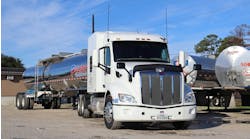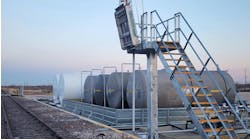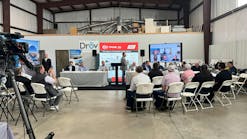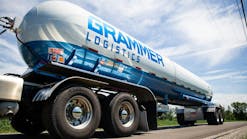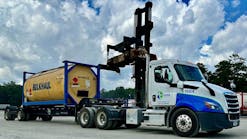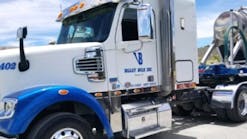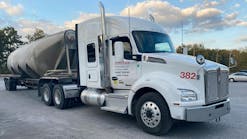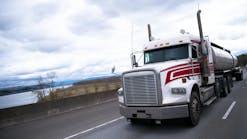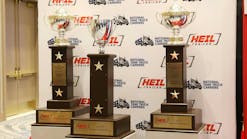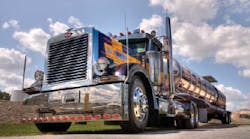Even as some tank truck carriers shifted to survival mode, others saw opportunity in the current economic chaos. Altom Transport Inc in Chicago, Illinois, is one of the trucking companies with an optimistic management team.
Nicknamed “The Elite Tanker Fleet,” Altom Transport positioned itself for renewed growth as the US economy recovers. Company-owned tractors are no more than four years old, and tank trailers are specified for efficiency and long life. The carrier has virtually no debt and serves a diverse customer base.
“We're profitable, and we are moving ahead with this company,” says Tom Warren Jr, Altom Transport vice-president of operations. “Our business was off only about 10% this year, because everyone at this company worked hard to keep our fleet busy. The future looks good for us, and we see growth ahead. We're innovative, and we have employees who really care about this company.”
Altom Transport was established in 1978 and built a premier operation that handles a diverse range of petroleum and chemical products. The for-hire carrier works closely with sister company Al Warren Oil Co, a wholesale petroleum marketer that serves customers within a 100-mile radius of Chicago.
“Our business mix consists of roughly 40% chemicals, 40% petroleum, and 20% asphalt and other cargoes,” Warren says. “We believe chemicals offer some of the best growth potential for the future, but we have no intention of dropping the petroleum side of the business. Our petroleum business has actually grown by about 60% over the past six years.
“At the same time, we've become a good regional carrier working with a lot of mid-size chemical companies. We focus on specialized loads, and we offer a diverse range of services. We're more than willing to work with our customers to add new services. That is one reason for our success.”
Preferred carrier
A Responsible Care partner, Altom Transport has worked hard to be the preferred carrier for its customers. While operations are concentrated in the eastern half of the United States, the carrier's 155 tractors and more than 350 tank trailers serve customers throughout the United States and the Canadian provinces of Ontario, Quebec, Manitoba, Saskatchewan, Alberta, and British Columbia.
Altom Transport is US Coast Guard approved for marine deliveries, and it offers pump-out service for petroleum and chemical products. The carrier is a highly qualified hazardous waste hauler in the United States and Canada. It runs dedicated equipment to haul a variety of aviation fuels. Altom Transport has its own 24-hour emergency spill response team, and the carrier has developed specialized capabilities for staging equipment for quick response to events such as hurricanes.
Operations are conducted from 13 terminals in Illinois, Indiana, Texas, Maryland, New York, Oklahoma, North Carolina, Colorado, Missouri, Arkansas, and Tennessee. Central dispatch at the main terminal in Chicago coordinates fleet activity throughout the system.
Dispatchers communicate with drivers via PeopleNet on-board computers. The cellular-based system also provides satellite tracking. Trailer status is monitored with hardware from Skybitz, and Altom Transport is testing trailer security technology from Hi-G-Tek.
Driver Retention
The drivers working with the dispatchers are among the best in the tank truck industry, according to Michael Crawford, safety director at Altom Transport. The carrier has achieved less than 5% driver turnover during the past 10 years, and average truck driving experience is 15 years. Slightly more than 60% of the drivers are company employees, and owner-operators account for the remainder.
“We have good retention for both company drivers and owner-operators for several reasons,” Crawford says. “We provide competitive compensation and 100% company benefits, including coverage for family medical, dental, vision, life insurance, and prescription medication. We provide excellent training, and we run one of the best-maintained, best-looking fleets in the industry.”
Experienced tank truck drivers are the preference, and applicants must have two years of verifiable truck driving experience. Altom Transport also began requiring Transportation Worker Identification Credential (TWIC) cards within the past couple of years.
Orientation Program
“Our drivers — especially on the fuel side — need the TWIC card because we do a lot of marine fueling,” Crawford says. “The card is needed for access to port areas. We move drivers around throughout our operation to keep them busy and meet our customer needs, which means all of our drivers need a TWIC card.”
Driver candidates selected for a position at Altom Transport start with a three-day orientation. Hazardous materials handling is a key focus of the program, and instructors emphasize incident prevention and mitigation. The Emergency Response Guidebook is covered in detail. Each section of the classroom training concludes with practical essay tests.
The Smith System is used for the defensive driving part of the orientation. Newly hired drivers also receive hands-on training in the handling of various products, including chemicals and aviation fuels.
A recent financial grant from the City of Chicago funded a range of training improvements. Exercise and other lifestyle factors were part of the training upgrade.
“We teach our drivers a series of stretching exercises for back, hips, and legs that were specifically designed for the truck-driving environment,” Crawford says. “The exercises take 10 to 15 minutes at the beginning of the work day and can be done at small workout area we set up at our Chicago terminal. We believe the exercise program contributed to no lost-time accidents in 2008 and helped us achieve a very good worker comp rating.”
Throughout the orientation, drivers are taught about the Altom Transport culture and history. They learn that the company has a passion for excellence that extends from driver attitude and performance to every other part of the company.
The passion for excellence clearly is evident in the fleet. “Image is very important to us,” Warren says. “We specify premium vehicles, and nobody has a better looking fleet as far as we are concerned. We have plenty of chrome and detail on all of our trucks. We really dress up company-owned trucks for the drivers that take the best care of their equipment.”
Virtually all of the company tractors in the fleet are Peterbilts, and the newest units are Model 389s. Altom Transport runs both daycab and 70-inch sleepers.
“Peterbilt has been the truck of choice at this company through three generations of the Warren family,” Warren says. “We have a good Pete dealer in this area, and Peterbilt builds a product with great quality, dependability, and resale value.”
Even with the recession, Altom Transport continued to buy new tractors. The current fleet is less than four years old. Warren believes that should enable the company to avoid buying any more new tractors until 2012 at the earliest.
Biodiesel fleet
“After trucks with the 2010 engines go into service, we want to give the market some time to settle down,” Warren says. “We want to see how those new engines perform. We think there will be a lot of low-mileage used trucks on the market for the next couple of years. Those trucks should meet our needs if we have to replace some equipment or expand our fleet.”
Altom Transport began specifying Cummins engines in 2007, and that will continue. The company uses ISX engines rated at 500-horsepower in the daycab tractors and 550-hp engines in the sleeper tractors. Eighteen-speed Fuller Roadranger transmissions are standard in all of the tractors.
Cummins allows biodiesel fuel blends up to B20 (20% biodiesel), and Altom Transport runs B11 in as much of its fleet as possible. “Biodiesel is good for us for several reasons,” Warren says. “In Illinois, we don't pay state sales tax on any biodiesel blend above B10. We've also seen engine performance improvements with biodiesel.”
Biodiesel is credited with boosting fuel economy by 3% to 4%. Cold flow improvers help ensure that there are no winter problems with the biodiesel.
Tractor-mounted product handling equipment includes Gardner Denver Hydrapak hydraulics powered off a Chelsea PTO. The hydraulic system is used to run Blackmer and Roper pumps and Gardner Denver compressors.
“For us, the Blackmer pumps work best with light oils and similar products,” Warren says. “Roper pumps do very well for viscous products. We mount pump and hydraulic controls outside the cab. Doing so has prevented a lot of offloading incidents. The control system is expensive, but it has paid dividends.”
On the tank trailer side, Altom Transport has been buying from Polar Tank Trailer LLC for the past 30 years. “They build a very good trailer that is price competitive,” Warren says. “They are very responsive to our requests, and they provide excellent service.”
Chemical trailers
For chemicals, the workhorse trailers in the fleet are DOT407 aluminum and stainless steel tanks. The carrier runs straight barrel and double-conical chemical trailers. Both insulated and uninsulated tanks are used. Capacity ranges from 7,000 to 9,000 gallons.
Used for solvents, water white chemicals, and aviation fuels, the aluminum DOT407 trailers are specified with Scully overfill protection. All of the chemical trailers have vapor recovery that can be operated from the ground, Betts valves and domelids, and Girard pressure-relief vents. Valves are steam-traced on insulated tanks.
Stainless steel subframes are the fleet standard on all of the trailers. New trailers are being ordered with Bendix roll stability as part of the running gear. Trailers also have Hendrickson's Intraax axle/air-suspension with Tiremaax and Pressure Guard inflation control, and Alcoa wheels. Altom Transport buys Continental and Bridgestone tires for dual applications and runs some Michelin X One wide tires on trailers and tractors.
Much of the maintenance for the fleet is handled in-house at the carrier's Chicago shop. Preventive maintenance is emphasized, but the mechanics can handle virtually any tractor or trailer issue. Emergency road service vehicles are ready to go at all times.
“We have the systems, personnel, and equipment in place to meet our customers' needs today and tomorrow,” Warren says. “This company is solidly focused on the future.” ♦
